Contemporary Issues in Accounting: Nestle's Sustainability Report
VerifiedAdded on 2020/05/16
|7
|1113
|80
Report
AI Summary
This report delves into the contemporary issues surrounding Nestle's sustainability efforts. It begins with an introduction to Nestle, highlighting its global presence and diverse product range, and emphasizes the importance of sustainability in business, defining it as the management of social, financial, and environmental risks and opportunities. The discussion section outlines various methods for building a sustainable company, including creating integrated public policies, fostering innovation, collaborating with the value chain, and engaging consumers in sustainability dialogues. It also explores the benefits of sustainable practices, such as increased productivity, cost reduction, regulatory compliance, risk mitigation, and improved brand image. The report then examines Nestle's current sustainability initiatives, including their involvement in sustainable agriculture, while also acknowledging the company's challenges, such as water sanitation issues and environmental pollution concerns. The conclusion suggests that Nestle should focus on preserving water, conserving biodiversity, reducing emissions, and improving environmental performance through packaging. The report concludes by emphasizing the importance of social and environmental responsibility, including stakeholder engagement, innovative practices, and waste reduction.
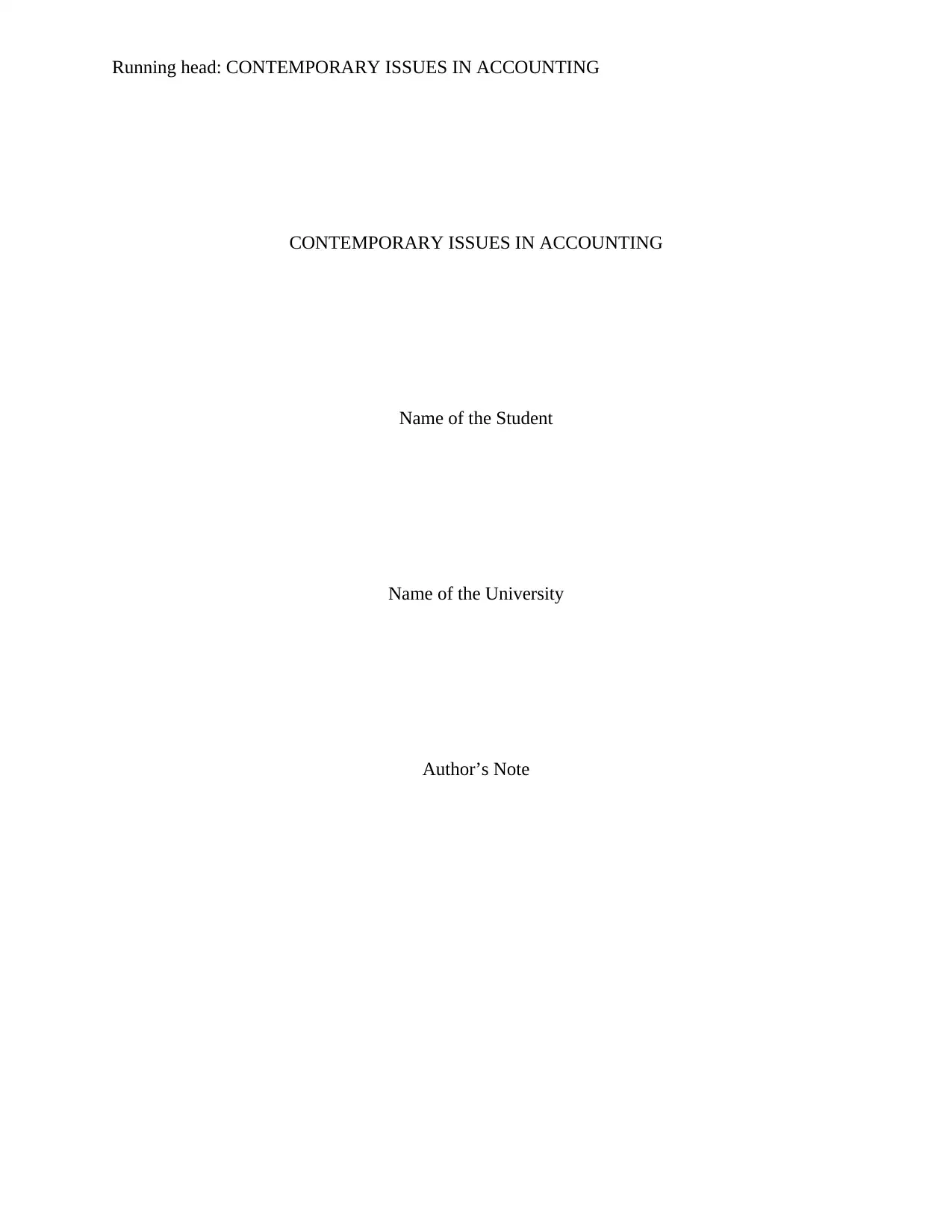
Running head: CONTEMPORARY ISSUES IN ACCOUNTING
CONTEMPORARY ISSUES IN ACCOUNTING
Name of the Student
Name of the University
Author’s Note
CONTEMPORARY ISSUES IN ACCOUNTING
Name of the Student
Name of the University
Author’s Note
Paraphrase This Document
Need a fresh take? Get an instant paraphrase of this document with our AI Paraphraser
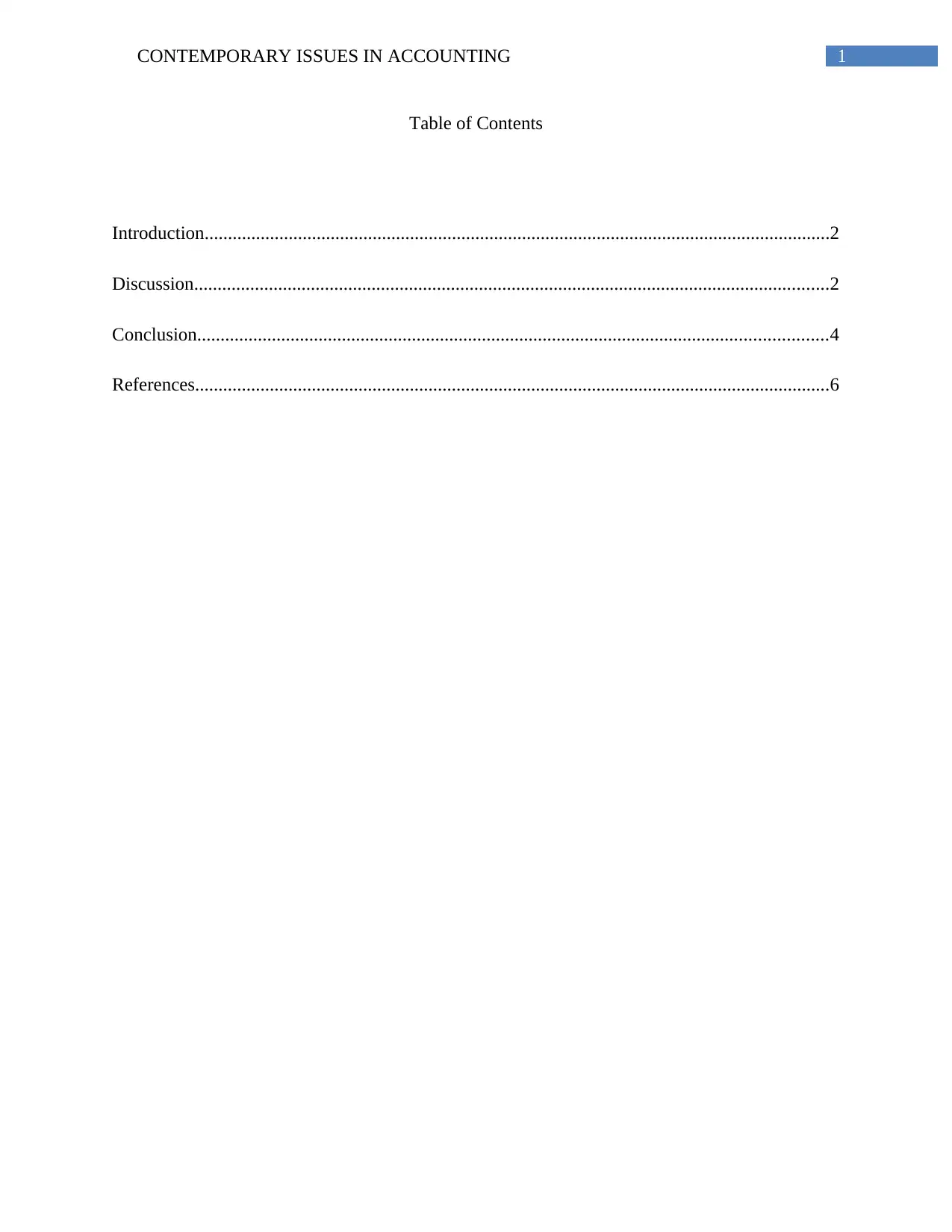
1CONTEMPORARY ISSUES IN ACCOUNTING
Table of Contents
Introduction......................................................................................................................................2
Discussion........................................................................................................................................2
Conclusion.......................................................................................................................................4
References........................................................................................................................................6
Table of Contents
Introduction......................................................................................................................................2
Discussion........................................................................................................................................2
Conclusion.......................................................................................................................................4
References........................................................................................................................................6
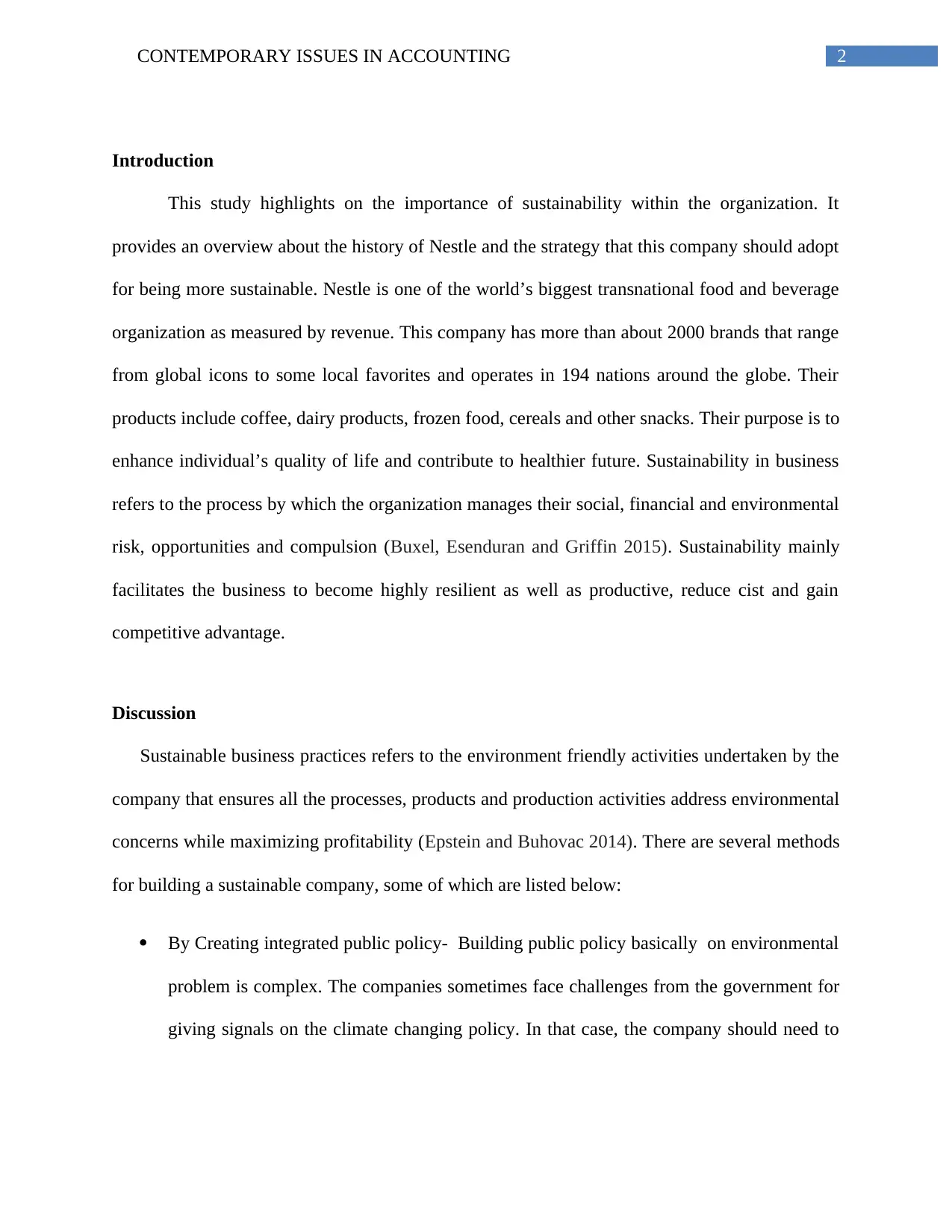
2CONTEMPORARY ISSUES IN ACCOUNTING
Introduction
This study highlights on the importance of sustainability within the organization. It
provides an overview about the history of Nestle and the strategy that this company should adopt
for being more sustainable. Nestle is one of the world’s biggest transnational food and beverage
organization as measured by revenue. This company has more than about 2000 brands that range
from global icons to some local favorites and operates in 194 nations around the globe. Their
products include coffee, dairy products, frozen food, cereals and other snacks. Their purpose is to
enhance individual’s quality of life and contribute to healthier future. Sustainability in business
refers to the process by which the organization manages their social, financial and environmental
risk, opportunities and compulsion (Buxel, Esenduran and Griffin 2015). Sustainability mainly
facilitates the business to become highly resilient as well as productive, reduce cist and gain
competitive advantage.
Discussion
Sustainable business practices refers to the environment friendly activities undertaken by the
company that ensures all the processes, products and production activities address environmental
concerns while maximizing profitability (Epstein and Buhovac 2014). There are several methods
for building a sustainable company, some of which are listed below:
By Creating integrated public policy- Building public policy basically on environmental
problem is complex. The companies sometimes face challenges from the government for
giving signals on the climate changing policy. In that case, the company should need to
Introduction
This study highlights on the importance of sustainability within the organization. It
provides an overview about the history of Nestle and the strategy that this company should adopt
for being more sustainable. Nestle is one of the world’s biggest transnational food and beverage
organization as measured by revenue. This company has more than about 2000 brands that range
from global icons to some local favorites and operates in 194 nations around the globe. Their
products include coffee, dairy products, frozen food, cereals and other snacks. Their purpose is to
enhance individual’s quality of life and contribute to healthier future. Sustainability in business
refers to the process by which the organization manages their social, financial and environmental
risk, opportunities and compulsion (Buxel, Esenduran and Griffin 2015). Sustainability mainly
facilitates the business to become highly resilient as well as productive, reduce cist and gain
competitive advantage.
Discussion
Sustainable business practices refers to the environment friendly activities undertaken by the
company that ensures all the processes, products and production activities address environmental
concerns while maximizing profitability (Epstein and Buhovac 2014). There are several methods
for building a sustainable company, some of which are listed below:
By Creating integrated public policy- Building public policy basically on environmental
problem is complex. The companies sometimes face challenges from the government for
giving signals on the climate changing policy. In that case, the company should need to
⊘ This is a preview!⊘
Do you want full access?
Subscribe today to unlock all pages.

Trusted by 1+ million students worldwide
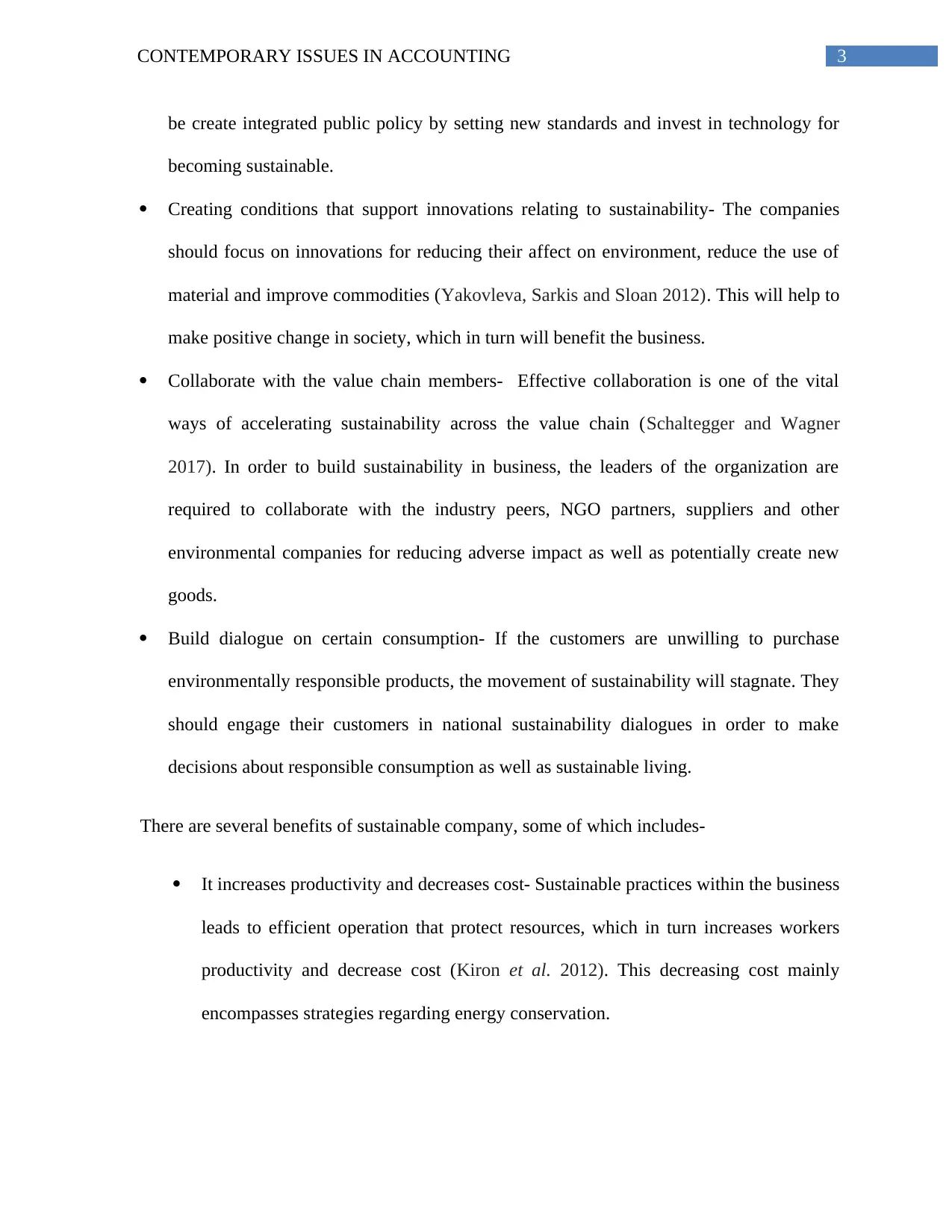
3CONTEMPORARY ISSUES IN ACCOUNTING
be create integrated public policy by setting new standards and invest in technology for
becoming sustainable.
Creating conditions that support innovations relating to sustainability- The companies
should focus on innovations for reducing their affect on environment, reduce the use of
material and improve commodities (Yakovleva, Sarkis and Sloan 2012). This will help to
make positive change in society, which in turn will benefit the business.
Collaborate with the value chain members- Effective collaboration is one of the vital
ways of accelerating sustainability across the value chain (Schaltegger and Wagner
2017). In order to build sustainability in business, the leaders of the organization are
required to collaborate with the industry peers, NGO partners, suppliers and other
environmental companies for reducing adverse impact as well as potentially create new
goods.
Build dialogue on certain consumption- If the customers are unwilling to purchase
environmentally responsible products, the movement of sustainability will stagnate. They
should engage their customers in national sustainability dialogues in order to make
decisions about responsible consumption as well as sustainable living.
There are several benefits of sustainable company, some of which includes-
It increases productivity and decreases cost- Sustainable practices within the business
leads to efficient operation that protect resources, which in turn increases workers
productivity and decrease cost (Kiron et al. 2012). This decreasing cost mainly
encompasses strategies regarding energy conservation.
be create integrated public policy by setting new standards and invest in technology for
becoming sustainable.
Creating conditions that support innovations relating to sustainability- The companies
should focus on innovations for reducing their affect on environment, reduce the use of
material and improve commodities (Yakovleva, Sarkis and Sloan 2012). This will help to
make positive change in society, which in turn will benefit the business.
Collaborate with the value chain members- Effective collaboration is one of the vital
ways of accelerating sustainability across the value chain (Schaltegger and Wagner
2017). In order to build sustainability in business, the leaders of the organization are
required to collaborate with the industry peers, NGO partners, suppliers and other
environmental companies for reducing adverse impact as well as potentially create new
goods.
Build dialogue on certain consumption- If the customers are unwilling to purchase
environmentally responsible products, the movement of sustainability will stagnate. They
should engage their customers in national sustainability dialogues in order to make
decisions about responsible consumption as well as sustainable living.
There are several benefits of sustainable company, some of which includes-
It increases productivity and decreases cost- Sustainable practices within the business
leads to efficient operation that protect resources, which in turn increases workers
productivity and decrease cost (Kiron et al. 2012). This decreasing cost mainly
encompasses strategies regarding energy conservation.
Paraphrase This Document
Need a fresh take? Get an instant paraphrase of this document with our AI Paraphraser
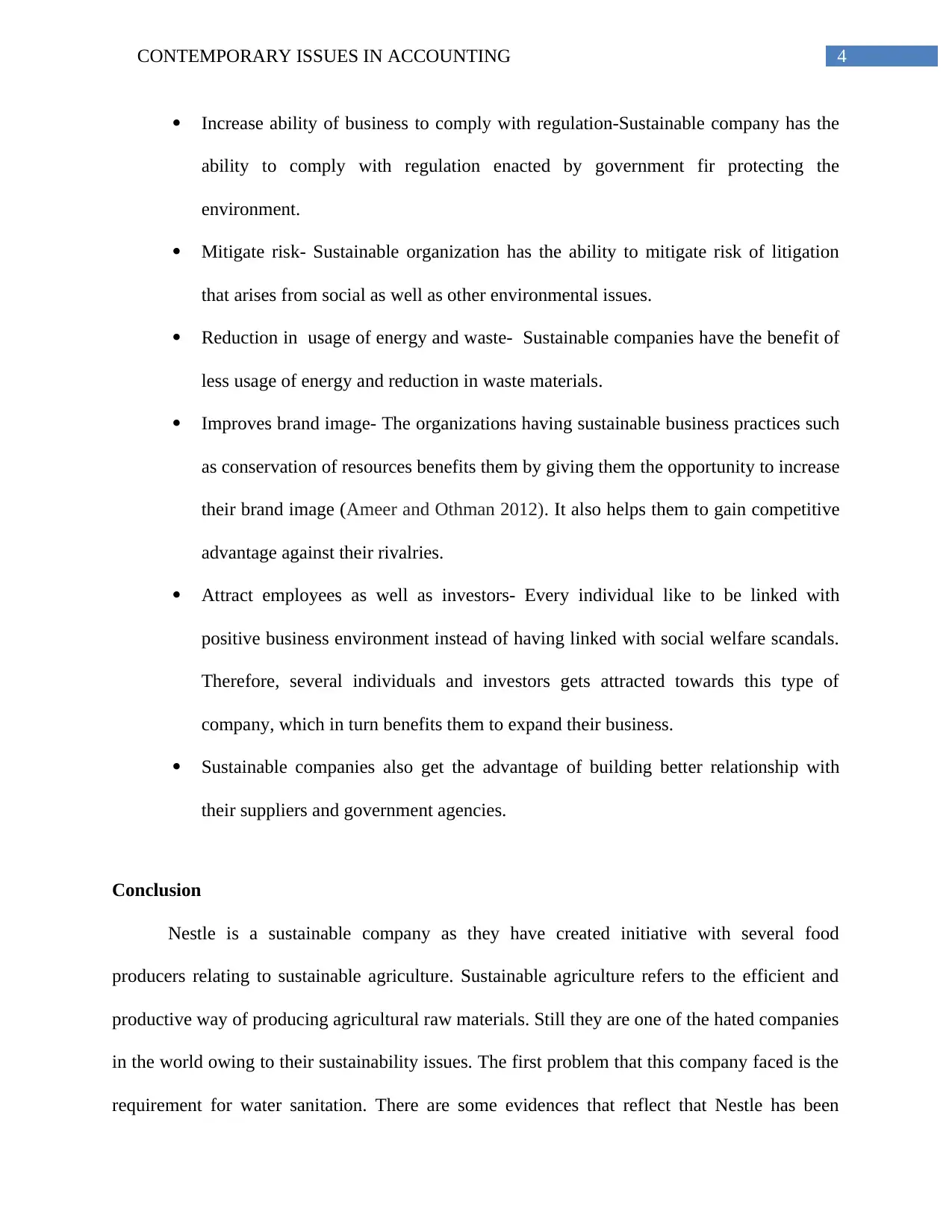
4CONTEMPORARY ISSUES IN ACCOUNTING
Increase ability of business to comply with regulation-Sustainable company has the
ability to comply with regulation enacted by government fir protecting the
environment.
Mitigate risk- Sustainable organization has the ability to mitigate risk of litigation
that arises from social as well as other environmental issues.
Reduction in usage of energy and waste- Sustainable companies have the benefit of
less usage of energy and reduction in waste materials.
Improves brand image- The organizations having sustainable business practices such
as conservation of resources benefits them by giving them the opportunity to increase
their brand image (Ameer and Othman 2012). It also helps them to gain competitive
advantage against their rivalries.
Attract employees as well as investors- Every individual like to be linked with
positive business environment instead of having linked with social welfare scandals.
Therefore, several individuals and investors gets attracted towards this type of
company, which in turn benefits them to expand their business.
Sustainable companies also get the advantage of building better relationship with
their suppliers and government agencies.
Conclusion
Nestle is a sustainable company as they have created initiative with several food
producers relating to sustainable agriculture. Sustainable agriculture refers to the efficient and
productive way of producing agricultural raw materials. Still they are one of the hated companies
in the world owing to their sustainability issues. The first problem that this company faced is the
requirement for water sanitation. There are some evidences that reflect that Nestle has been
Increase ability of business to comply with regulation-Sustainable company has the
ability to comply with regulation enacted by government fir protecting the
environment.
Mitigate risk- Sustainable organization has the ability to mitigate risk of litigation
that arises from social as well as other environmental issues.
Reduction in usage of energy and waste- Sustainable companies have the benefit of
less usage of energy and reduction in waste materials.
Improves brand image- The organizations having sustainable business practices such
as conservation of resources benefits them by giving them the opportunity to increase
their brand image (Ameer and Othman 2012). It also helps them to gain competitive
advantage against their rivalries.
Attract employees as well as investors- Every individual like to be linked with
positive business environment instead of having linked with social welfare scandals.
Therefore, several individuals and investors gets attracted towards this type of
company, which in turn benefits them to expand their business.
Sustainable companies also get the advantage of building better relationship with
their suppliers and government agencies.
Conclusion
Nestle is a sustainable company as they have created initiative with several food
producers relating to sustainable agriculture. Sustainable agriculture refers to the efficient and
productive way of producing agricultural raw materials. Still they are one of the hated companies
in the world owing to their sustainability issues. The first problem that this company faced is the
requirement for water sanitation. There are some evidences that reflect that Nestle has been
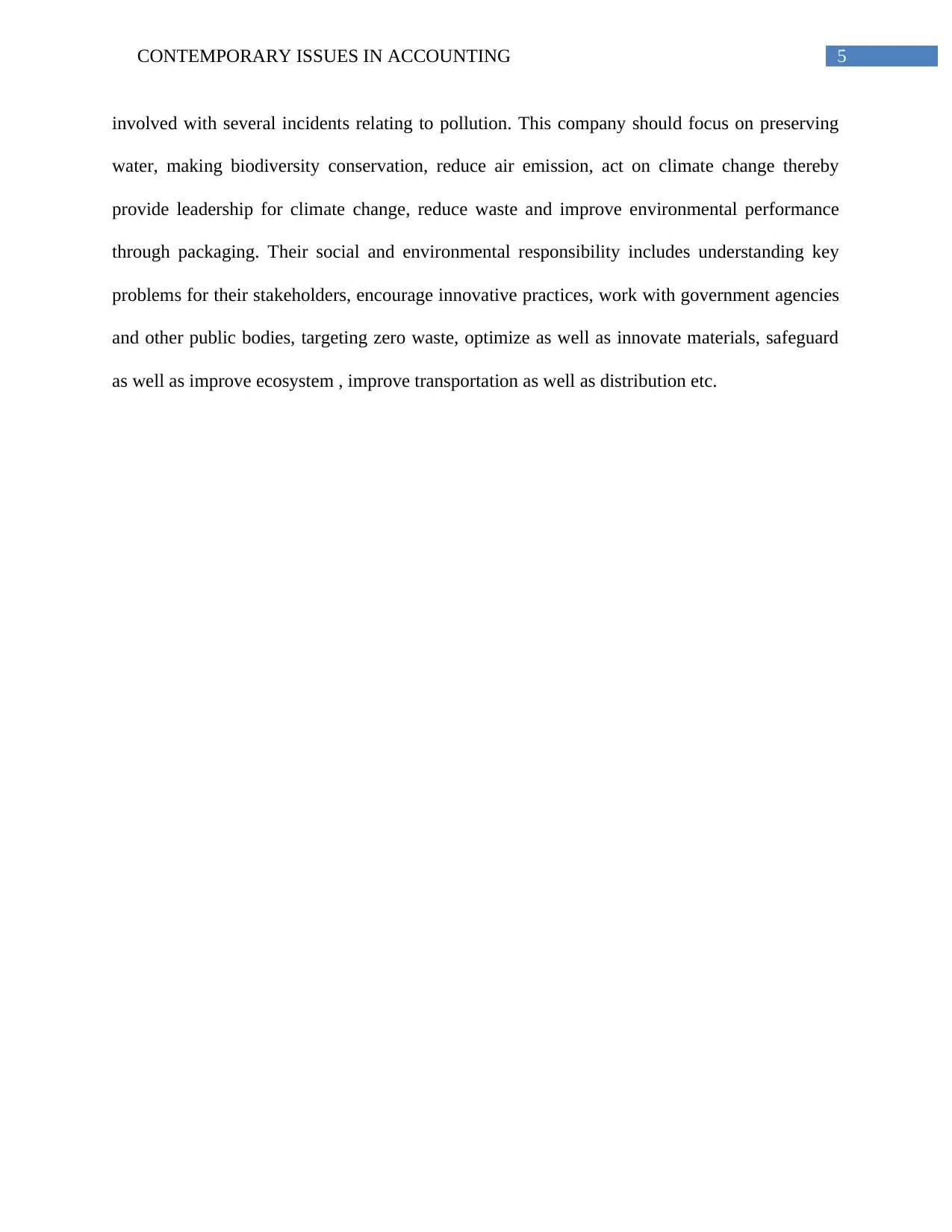
5CONTEMPORARY ISSUES IN ACCOUNTING
involved with several incidents relating to pollution. This company should focus on preserving
water, making biodiversity conservation, reduce air emission, act on climate change thereby
provide leadership for climate change, reduce waste and improve environmental performance
through packaging. Their social and environmental responsibility includes understanding key
problems for their stakeholders, encourage innovative practices, work with government agencies
and other public bodies, targeting zero waste, optimize as well as innovate materials, safeguard
as well as improve ecosystem , improve transportation as well as distribution etc.
involved with several incidents relating to pollution. This company should focus on preserving
water, making biodiversity conservation, reduce air emission, act on climate change thereby
provide leadership for climate change, reduce waste and improve environmental performance
through packaging. Their social and environmental responsibility includes understanding key
problems for their stakeholders, encourage innovative practices, work with government agencies
and other public bodies, targeting zero waste, optimize as well as innovate materials, safeguard
as well as improve ecosystem , improve transportation as well as distribution etc.
⊘ This is a preview!⊘
Do you want full access?
Subscribe today to unlock all pages.

Trusted by 1+ million students worldwide
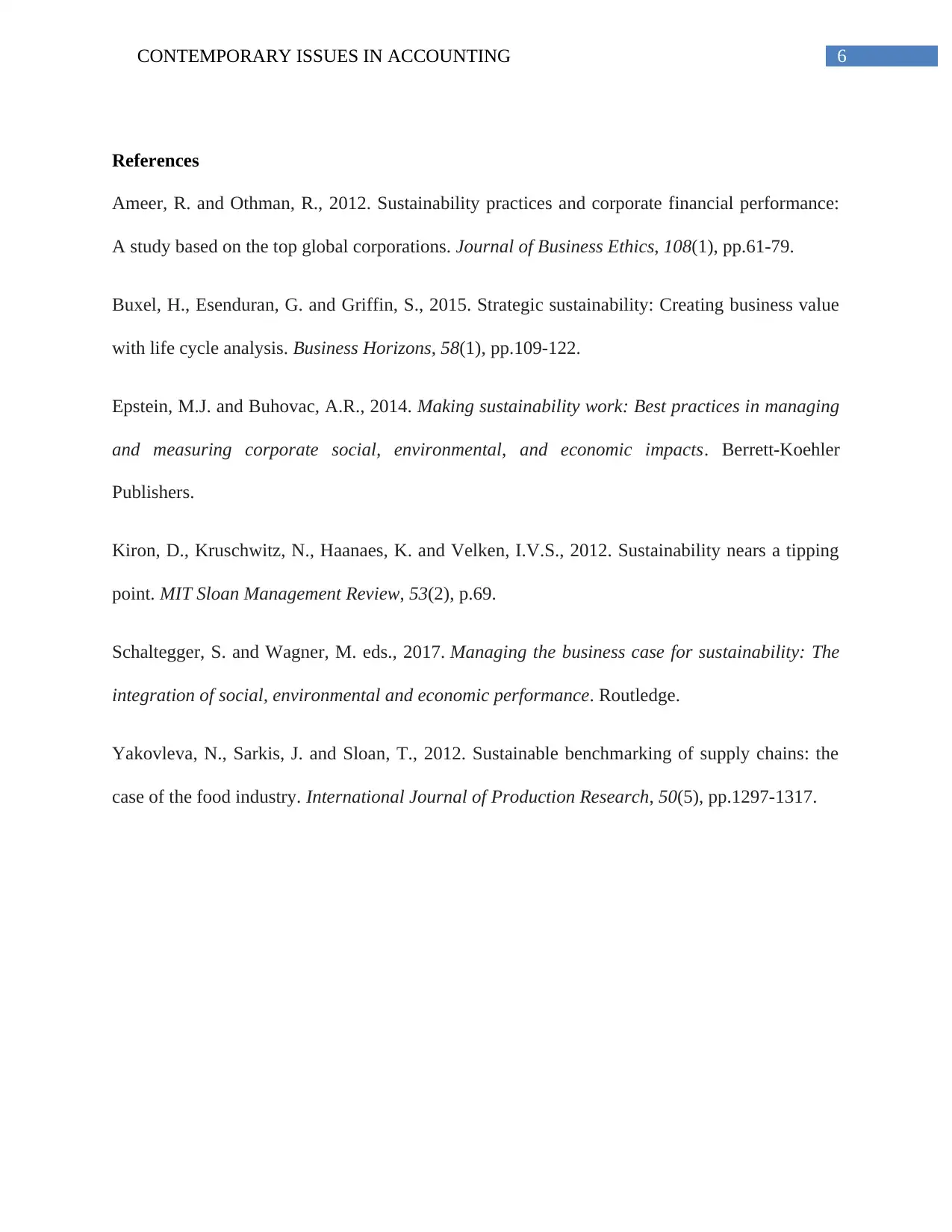
6CONTEMPORARY ISSUES IN ACCOUNTING
References
Ameer, R. and Othman, R., 2012. Sustainability practices and corporate financial performance:
A study based on the top global corporations. Journal of Business Ethics, 108(1), pp.61-79.
Buxel, H., Esenduran, G. and Griffin, S., 2015. Strategic sustainability: Creating business value
with life cycle analysis. Business Horizons, 58(1), pp.109-122.
Epstein, M.J. and Buhovac, A.R., 2014. Making sustainability work: Best practices in managing
and measuring corporate social, environmental, and economic impacts. Berrett-Koehler
Publishers.
Kiron, D., Kruschwitz, N., Haanaes, K. and Velken, I.V.S., 2012. Sustainability nears a tipping
point. MIT Sloan Management Review, 53(2), p.69.
Schaltegger, S. and Wagner, M. eds., 2017. Managing the business case for sustainability: The
integration of social, environmental and economic performance. Routledge.
Yakovleva, N., Sarkis, J. and Sloan, T., 2012. Sustainable benchmarking of supply chains: the
case of the food industry. International Journal of Production Research, 50(5), pp.1297-1317.
References
Ameer, R. and Othman, R., 2012. Sustainability practices and corporate financial performance:
A study based on the top global corporations. Journal of Business Ethics, 108(1), pp.61-79.
Buxel, H., Esenduran, G. and Griffin, S., 2015. Strategic sustainability: Creating business value
with life cycle analysis. Business Horizons, 58(1), pp.109-122.
Epstein, M.J. and Buhovac, A.R., 2014. Making sustainability work: Best practices in managing
and measuring corporate social, environmental, and economic impacts. Berrett-Koehler
Publishers.
Kiron, D., Kruschwitz, N., Haanaes, K. and Velken, I.V.S., 2012. Sustainability nears a tipping
point. MIT Sloan Management Review, 53(2), p.69.
Schaltegger, S. and Wagner, M. eds., 2017. Managing the business case for sustainability: The
integration of social, environmental and economic performance. Routledge.
Yakovleva, N., Sarkis, J. and Sloan, T., 2012. Sustainable benchmarking of supply chains: the
case of the food industry. International Journal of Production Research, 50(5), pp.1297-1317.
1 out of 7
Related Documents
Your All-in-One AI-Powered Toolkit for Academic Success.
+13062052269
info@desklib.com
Available 24*7 on WhatsApp / Email
![[object Object]](/_next/static/media/star-bottom.7253800d.svg)
Unlock your academic potential
Copyright © 2020–2026 A2Z Services. All Rights Reserved. Developed and managed by ZUCOL.





